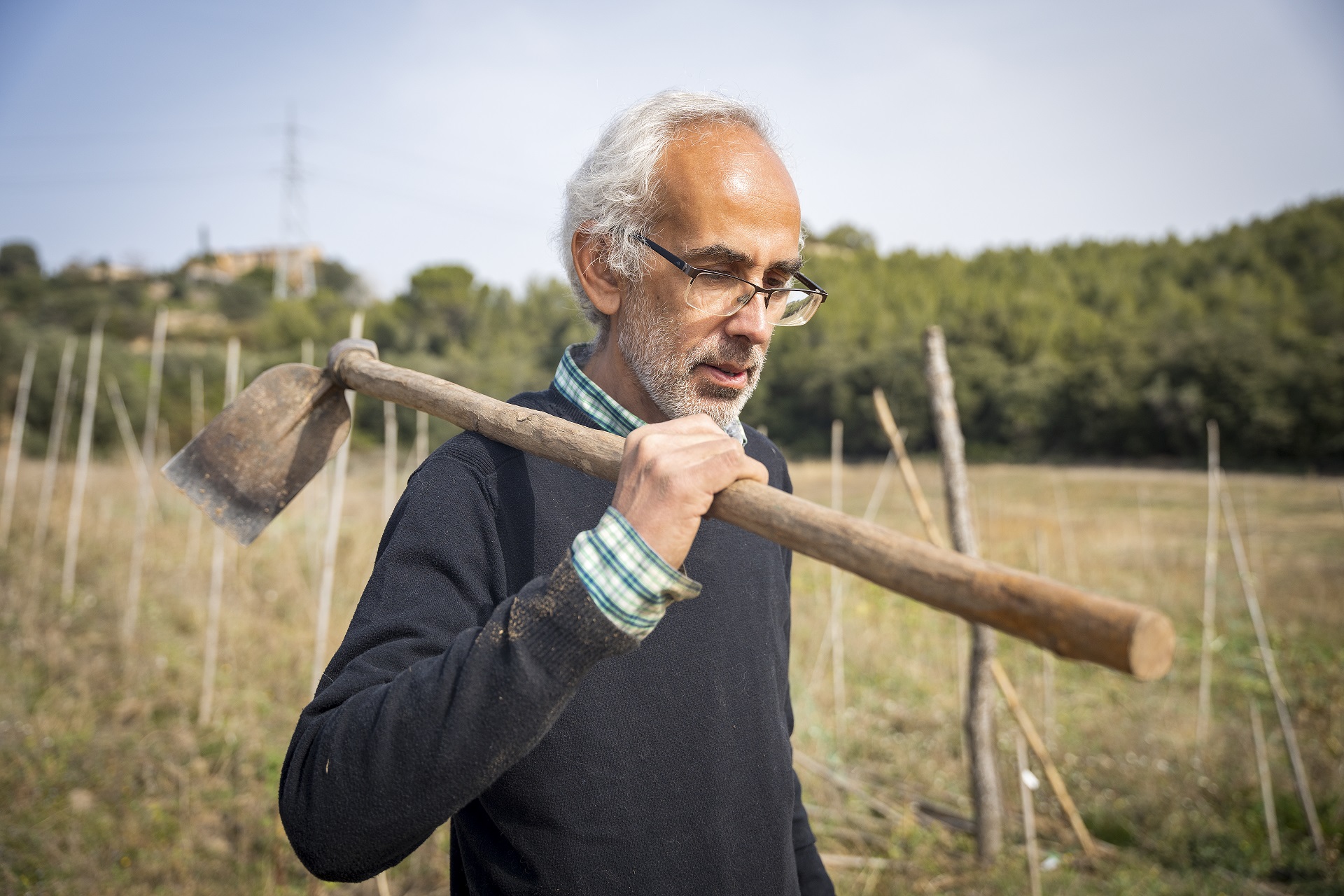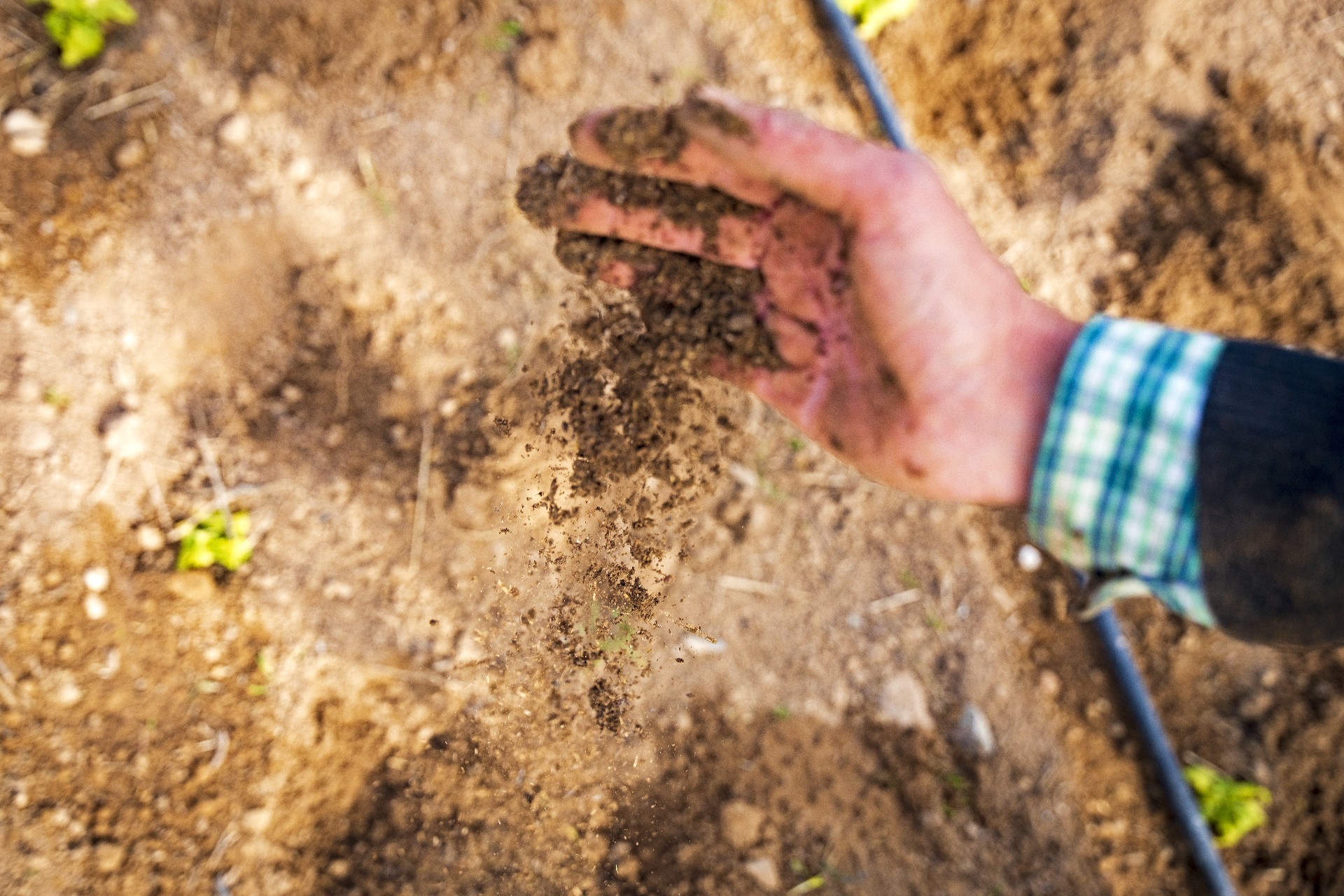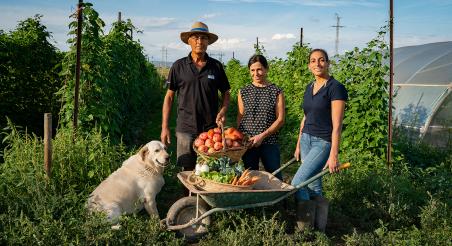Albert Carol (Barcelona, 1967) has spent most of his life in Martorell, although his desire to explore new farming approaches has taken him to almost every continent, where he’s admired the resilience of the natural world. A gardener and farmer by profession, he’s been working full-time in the production area of the Can Pastallé farm for three years.
Ernest Soler is the instigator and owner of this company, a project that began life in 2020 with the goal of promoting a healthier diet and growing vegetables “the way they used to taste”. Can Pastallé uses several sales channels for its products: customised boxes of fruit and veg, an on-site farm shop, a stall at the Saturday market in Plaça dels Carros in Tarragona, the Mercabarna wholesale market (where it sells its surplus produce) and a recently opened store in the Barcelona neighbourhood of La Bonanova. Ernest explains that they’ve opened this latest retail outlet in order to strengthen the business.
An innovative, globetrotting farmer
A winding path leads up from the county of Baix Llobregat to this beautiful Mediterranean farmhouse in the county of Vallès Occidental, surrounded by fields of vegetables and home to two horses as white as the house. Despite its proximity to industrial areas, time seems to flow differently here, connected to the cosmos. Albert, who’s perfectly attuned to the rhythms of nature, explains it like this: “We’ve got a melting clock here, like the ones Dalí painted.”
«We’ve got a melting clock here, like the ones Dalí painted» Albert Carol
Albert arrived at Can Pastallé on the recommendation of a relative: “Seeing a skinny guy like me, they might think I’ll be no good as a farmer, but I’ve come recommended so everything flows.” He enjoys innovating and, like any good Gemini, his mind is always buzzing with ideas. With the help of his work colleagues, he’s managed to bring quite a few of them to life on the farm, such as the small mobile chicken coop they’ve built, or the false yellowhead they’ve planted to protect their tomatoes from caterpillars. Albert also tells us about other inventions and strategies they’ve got planned, including a mesh that will not only provide the plants with shade but also prevent evaporation and save water. He’s happy with the quality of the soil on the farm, which is clayey and sandy: “A great combination, one of the best I’ve ever worked with.” He applies some of the principles of the biodynamic approach in his management of the farm. For example, he makes compost from the horses’ manure and follows the lunar calendar. As he explains, in biodynamic farming, days can be defined in four ways, depending on whether it’s the right time to boost the growth of the roots, leaves, flowers or fruits of plants.
Albert describes his work with admirable passion. Listening to him, you’d think he’d been a farmer all his life, but, in fact, he didn’t develop an interest in the profession until he was 28 years old, when his family bought a house with land in Castellví de Rosanes, in the county of Baix Llobregat. It had 4,000 m2 of orchards and vegetable gardens. “That’s where I started working the land, adopting organic farming practices from day one; I’ve never had to retrain or make the switch,” he explains.
«That’s where I started working the land, adopting organic farming practices from day one; I’ve never had to retrain or make the switch» Albert Carol
He’s also worked with other farmers and in other organic vegetable gardens. After spending time in Sant Cugat del Vallès and Menorca, he headed abroad, on a journey that took in the French Pyrenees, Africa, India and Mexico. One thing Albert has discovered on his travels around the world is that every climate and ecosystem is different, that there’s no universal method that works everywhere. His stays abroad have been organised through Worldwide Opportunities on Organic Farms (WOOF), an international movement that facilitates exchanges on organic farms. He feels that these stays have provided him with an inexhaustible wealth of knowledge, as well as offering him the chance to practice his English and French. “And it hasn’t cost me a penny anywhere in the world!” he adds, laughing.
Agricultural apprenticeships on stays abroad
One of Albert’s longest stays was in Mexico, where, in addition to his volunteering work, he collaborated with a university and deepened his knowledge of tropical agriculture. During his stay, he met a farmer and shaman who managed to obtain very large yields, as well as growing giant vegetables such as 35 kg cabbages or 15 kg beetroots. Meeting this Mexican farmer was fantastic and Albert has fond memories of the many experiments and tests they did together. They once asked a group of agronomy students to each grow a row of plants, which led to a surprising discovery: while the crops of some of the participants withered, those of others thrived. “The plant’s growth didn’t depend so much on fertilisers but rather on the degree of empathy shown by the person tending to it. The plants that I tend to also grow well, apart from the fact that they have good soil,” he says.
«The plant’s growth didn’t depend so much on fertilisers but rather on the degree of empathy shown by the person tending to it» Albert Carol
Mexico proved to be a bona fide agricultural laboratory for Albert. One of the university lecturers he got to know there had a two-hectare estate in the Mayan jungle and Albert was able to spend a year there, cultivating habanero chilis, which are famed for their heat. During his stay, he managed to feed himself with what he grew in the fields and what he collected in the forest, where there were bananas, chestnuts and mangoes, among other fruits.
“Travelling around the world has given me the chance to learn about several agricultural methods,” explains Albert. In addition to discovering different techniques, he’s also learned valuable lessons about dealing with climate change. After being in a humid tropical area, where rain is constant, he decided to move to a dry area, where it only rained three months a year. Despite the lack of water, he noted that there were trees that survived throughout the year, having adapted to the climate. “At first, I approached land management with a European mindset, but that was no good to me out there," Albert recalls.
At Can Pastallé, Albert works alongside a Latin American farmer, and they get on well together. However, his working relationship with younger farmhands hasn’t been as smooth. He complains that some of them wouldn’t listen to him and instead tried to teach him lessons.
Albert says that farming gives him plenty of freedom, although he quickly adds a caveat: “But you have to like it, right? If you’re in it for the money, you should do something else with your life.” He admits that some Sundays, when he’s at a loose end, he heads over to the farm to see how the crops are doing. He says that if he spent his working life stuck between four walls, he’d only be able to do highly creative office work. In fact, he once served in the army as a draftsman, a job he enjoyed. What he can’t stand is monotony: “If you give me something easy to do, I get bored. Cultivating the land can get repetitive, but I change things around and innovate.”
«Travelling around the world has given me the chance to learn about several agricultural methods» Albert Carol
Training to innovate
It’s necessary to be familiar with different methodologies in order to be able to innovate. Albert has taught courses for working farmers at the Agricultural School of Manresa and for the L'Era association (Space for Organic Farming Resources). Together with Tomàs Llop, he taught a course on natural pruning techniques. “It’s important to have a scientific grounding in everything you do in this profession,” he argues. He recently attended a course on regenerative agriculture and is keen to apply this methodology at Can Pastallé. In fact, he’s a member of a Telegram chat group on the topic, in which new developments and ideas for farms are shared. Ernest, the farm’s owner, shares this vision: the project came into being with the goal of being organic and biodynamic. As such, he feels that evolving towards regenerative agriculture is a natural transition.
Looking at his group of friends, Albert realises that many of them are involved in the primary sector, but he also receives support from people outside the profession. He says that none of his friends are consumerists. One thing he’s noticed is that people often don’t not buy as much as they’d like to because they’re swamped with work.
«It’s important to have a scientific grounding in everything you do in this profession» Albert Carol
Albert feels that time management is one of the most common ills of society in the 21st century, but he’s also concerned about the structural lack of interest in farming. “The country has become too industrial and digital; people aren’t motivated to help farmers.” It’s something he knows all to well from personal experience: he launched a small-scale social media appeal and no one from the Martorell area was willing to collaborate with Can Pastallé. He says this is evidence of the loss of what he calls “rural philosophy”. In the past, the reality of farming was different. Albert reminds us that farmers made up 80% of the population in the old days, whereas this percentage is now around 2% and shrinking.
Despite the lack of support, Albert Carol has an idea for reengaging with consumers. He often comes across people who come to buy produce on the farm and don’t return until two months later. He thinks that community-promoted farming might be a way to strengthen these ties: “It’s important for consumers to engage with and be connected to the vegetable garden. You don’t have to work there, but you do have to maintain a relationship with it. Besides, this helps people to find a mental balance.” The world of work confines people to offices and cuts them off from each other, whereas social relations can be established in the vegetable garden. At Can Pastallé they plan to organise educational visits, so it may be possible to implement this idea.
«It’s important for consumers to engage with and be connected to the vegetable garden» Albert Carol
Management and adaptation at Can Pastallé
Albert is extremely busy managing the farm. When we visit it, we can see all the seasonal vegetables that have been planted: spring onions, calçots (Catalan green onions), broccoli (he says they’ve harvested broccoli heads weighing up to three kilos), Swiss chard, garlic, Brussels sprouts, red cabbages, leeks, beans, beetroots and many other vegetable varieties.
Fortunately, they’re never visited by wild boars or roe deer, but they have had to put up fences to keep rabbits out after they ate the tenderest shoots. They’ve deployed an invention that a friend of Albert’s showed them to scare away birds, which are also regular visitors to Can Pastallé. It consists of sheets of paper that make a noise and dazzle them, while being completely harmless. “Within one day, there were no more wood pigeons. It’s a reflective material that’s used as foils on cava corks,” he explains.
Another example of innovation is related to repairs. The farm’s rotary cultivator tractor wasn’t powerful enough, so they decided to fit it with a larger set of blades. Now it ploughs much more efficiently. Albert always insists that “farmers have to be inventors and mechanics; they have to be jacks of all trades.” As he sees it, if they had to rely on specialists to solve every little problem, there’d be no end to it. That’s why his DIY skills are another important string to his bow.
At Can Pastallé, they’re adapting to climate change in various ways. They use water from the agricultural network and have implemented drip irrigation systems. In addition, when they consider it necessary, they use techniques such as mulching. They’re also studying the possibility of installing meshes to provide shade. Due to the drought, the farm’s almond and olive trees are producing smaller yields, except for the ones located near the farmhouse. Albert acknowledges that, if the drought worsens, they’ll have to implement more forest management measures.
The challenges of the sector
The future of the primary sector worries Albert. Although he’s positive about the existence of land banks, he feels they don’t work as well as they should. As he sees it, when someone announces the transfer of a farm, there’s always plenty of interest. “At the same time, everything’s being abandoned. The public authorities are slow to facilitate access to land through leases,” he complains.
Looking at the challenges facing farmers, Albert highlights two other relevant issues: first of all, he considers it disgraceful that foreign multinationals are buying up farming estates and believes it’s necessary to protect rural land; secondly, he’s opposed to the total mechanisation of agricultural processes. “If everything’s done by machines, where’s the human factor? Food ends up becoming a product with no flavour or soul,” he says, adding: “Ultimately, how food tastes is an indicator of the quality of the farming. If top chefs opt for products grown using the biodynamic approach, it’s because they consider the aspect we can’t see, the spiritual aspect of crops.”
To wrap up our chat with Albert, we ask him if he thinks he’s living a good life. “I’m on the right track. It’s not perfect, but it’s got better. As Gaudí said, originality consists of returning to the origin. And, for me, a good life means going back. I think we have to take a step backwards, because technology has made us lose our way. We have to go back to the traditional ways, to how life was a hundred years ago, because there was a stronger connection with the rhythms of nature... Everything was less artificial, and that made us feel better.”
Albert’s words remind us of what’s essential and reveal truths that are often more palpable to farmers than to any other human group.
— BCN Smart Rural Editorial —




